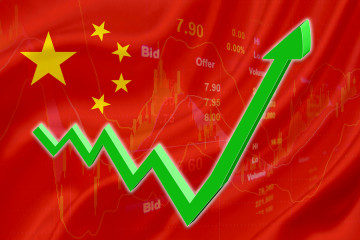Copying China Bailout Fund Is Great Way to Lose Money in Stocks

©2015 Bloomberg News
Fox Hu
(Bloomberg) — It looked like the perfect target for copycat investors in China: a state-run agency armed with more than $400 billion to prop up share prices.
When the filings came in — showing China Securities Finance Corp. had taken major stakes in companies as part of its market-rescue effort — traders jumped to buy what they dubbed on social media as “the King’s favorite concubines.” Unfortunately for the copycats, an endorsement from the equity market’s savior has done nothing to ensure outsized returns. In fact, it’s just the opposite — the stock picks have trailed the broader market. The 46 companies that reported the agency as a top 10 shareholder in the past two months lost an average 29 percent since the announcement, versus a 21 percent drop for the Shanghai Composite Index.
The underperformance is a sign that the pace of China Securities Finance purchases is slowing as authorities become less concerned about an equity-market freefall. While the agency will remain in the market for years to come, it won’t normally step in unless there’s unusual volatility and systemic risks, the China Securities Regulatory Commission said on Aug. 14. Among the fund’s purchases were Eastern Gold Jade Co., a jewelry company, and Guangdong Meiyan Jixiang Hydropower Co., an investment firm.
“Market forces are now playing a larger role while the ‘national team’ is doing less,” said Ronald Wan, chief executive at Partners Capital International in Hong Kong. “It’s risky for investors to just copy the fund as the state has considerations beyond commercial reasons.”
State Spending
Chasing stocks bought by the rescue fund are another sign of how state intervention is leading to price distortions in the world’s second-largest equity market. Instead of looking at a company’s earnings or valuation outlook, traders tried to second-guess the target of state funds. The government has spent 1.5 trillion yuan ($246 billion) buying shares since the rout began three months ago through August, according to Goldman Sachs Group Inc.
The Shanghai Composite Index dropped 0.1 percent at 10:07 a.m. local time, extending its biggest two-day loss in three weeks.
The government fund’s shopping list proved diverse. Among the targets were drug makers, builders, chemical producers, miners, auto-equipment manufacturers, power producers, food suppliers as well as financial companies. Six of the companies reported a loss last year and another 11 posted declining profit.
Jewelry Company
Investors didn’t seem to care. Turnover jumped an average of 35 percent the day after the companies said China Securities Finance had bought their shares.
Eastern Gold Jade rallied by the 10 percent daily limit on Aug. 17, the first trading day after disclosing China Securities Finance had accumulated a 4.2 percent stake as its third-biggest shareholder. Gains didn’t last, with the stock tumbling 49 percent since the announcement, compared with a 24 percent retreat for the Shanghai Composite. Even after the losses, the Shenzhen-based company — which reported a 37 percent drop in net income last year — trades at 4.7 times price-to book.
Tianjin Zhonghuan Semiconductor Co. has slumped 54 percent to a nine-month low since revealing China Securities Finance’s interest on Aug. 12.
In other cases, investors needed to be quick. Loss-making Guangdong Meiyan Jixiang Hydropower climbed more than 150 percent over 11 days after saying on Aug. 3 the state rescue fund had bought shares. The stock has since plunged 49 percent.
Even after the declines, the 46 companies trade at an average 3.2 times book value, compared with the Shanghai Composite Index’s 1.8 multiple.
“In terms of what it bought, the government fund has done a terrible job,” said Francis Lun, chief executive officer at Geo Securities Ltd. in Hong Kong. “They should have just bought index stocks.”
–With assistance from Sarah McDonald in Sydney and Michael Patterson in Hong Kong.
To contact the reporter on this story: Fox Hu in Hong Kong at fhu7@bloomberg.net To contact the editors responsible for this story: Richard Frost at rfrost4@bloomberg.net Sandy Hendry





No Comment